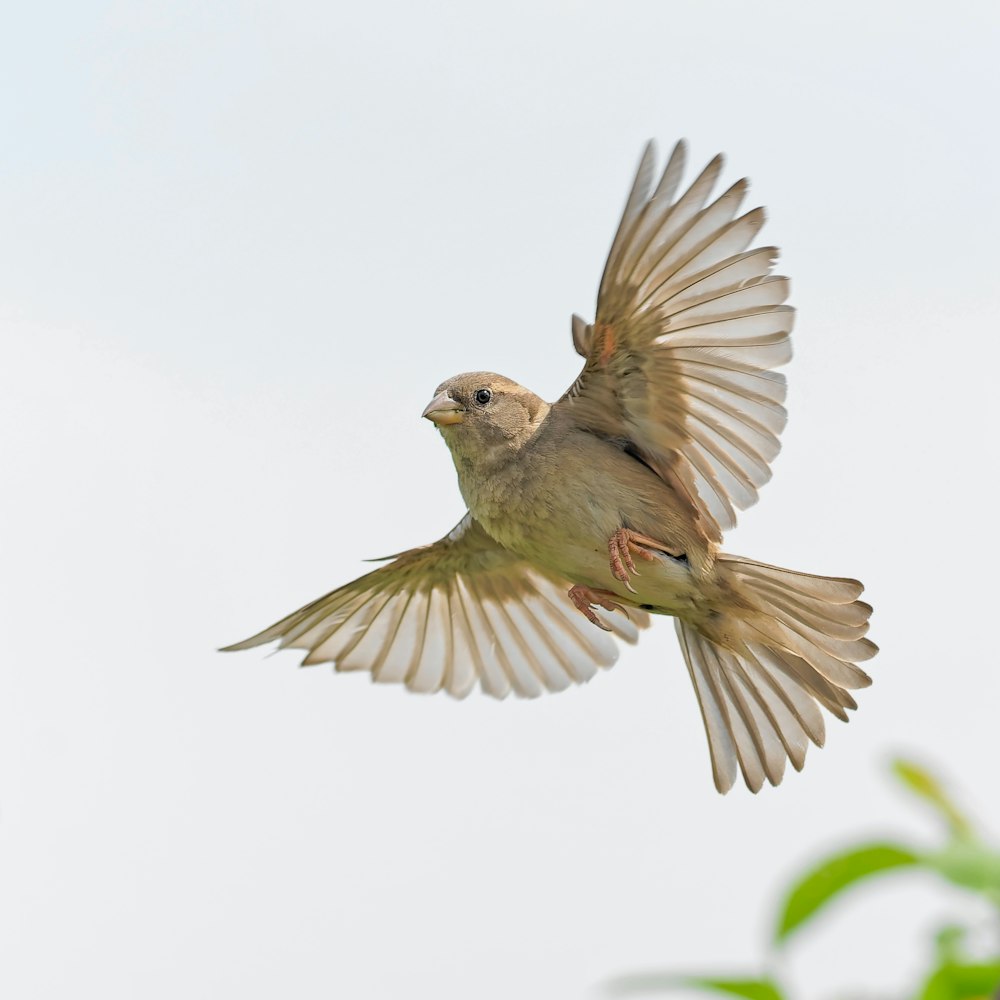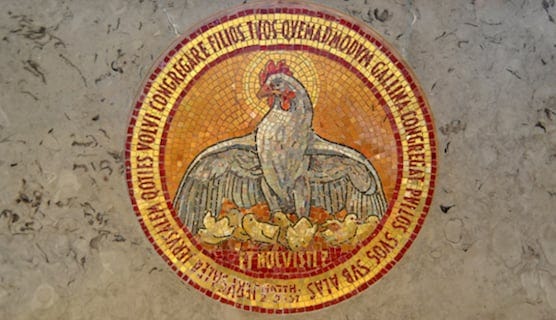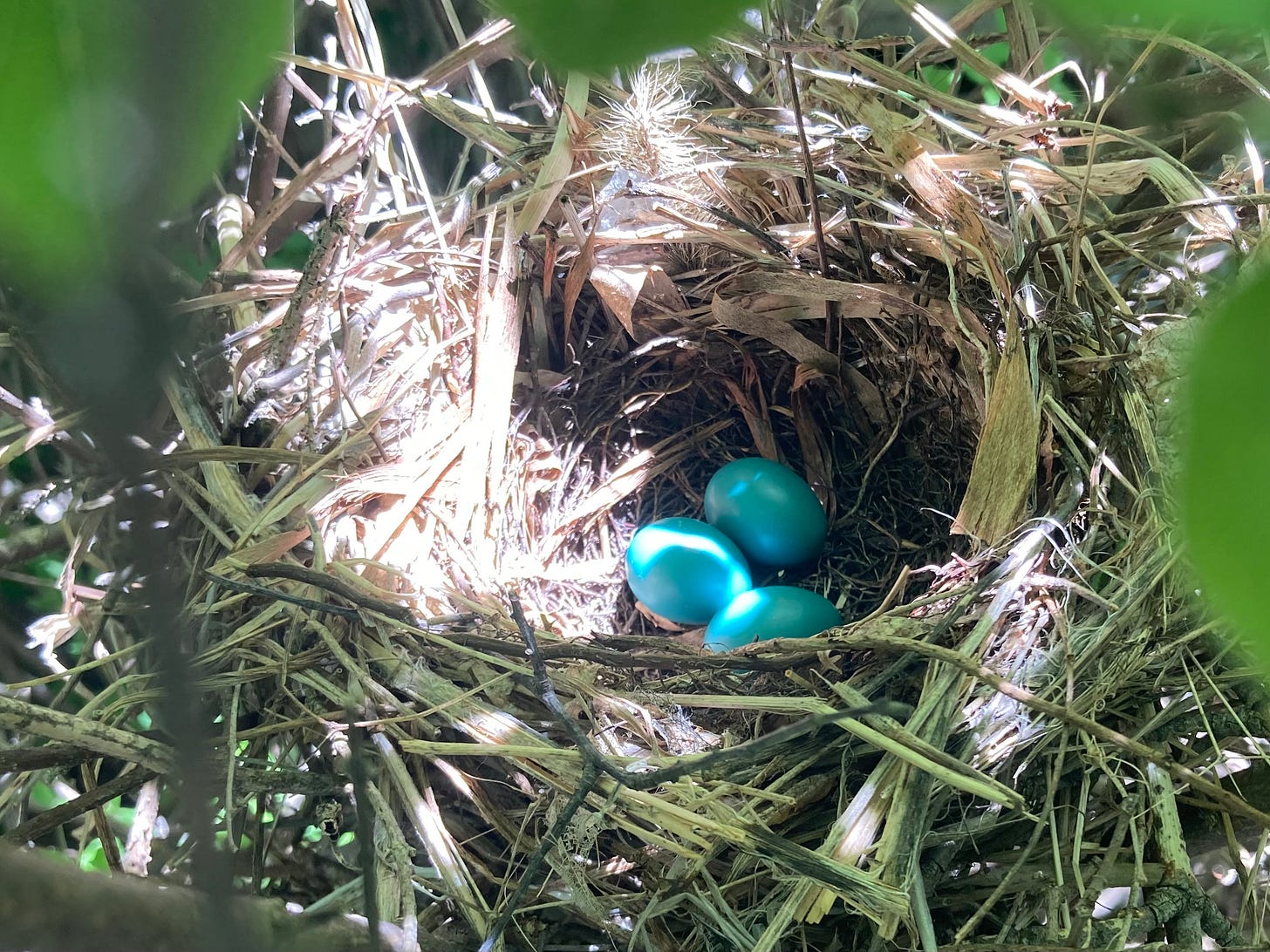I.
All spring she eyed me suspiciously. Well she should, giant as I loomed over her nest. Each time I passed the front door, coming or going, I caught the robin’s beady eye. Watching me watching her.
“It’s ok, mama,” I took to saying softly as I circled the lilac bush. What kind of weirdo talks to a bird, I wondered, but still it became my daily practice. Whenever my children burst out the door clamoring like puppies, alarming her with noise and activity, I wanted her to know, one mother to another, that I would protect her as she protected her own.
The year before had brought forth no babies. The empty nest, the shattered eggs, the mutilated bodies on the ground broke both our hearts. For weeks I had watched with her, keeping vigil from my office window where I could spy the nest without disturbing her. Eager for birth, I googled how long robin eggs take to hatch and counted down the days on my fingers.
But no sign came. My brooding heart began to ache for her, remembering my own days of infertility, miscarriage, loss. The instinctual, animal longing for life.
A week later, the nest was plundered. Not a single speckled blue egg of hope remained.
So when I watched a male robin this fresh morning, beak stuffed with dry dead grass to gather for a new nest, bending and pecking over and over and over to carry as much as he could, taking flight for the neighbor’s yard with his whole hopeful mouthful, I remembered the mother robin from years past.
Would she return, too? Would she come for us—for them—again?
God will shelter you with his pinions,
and under his wings you may take refuge;
his faithfulness is a protecting shield.
(Psalm 91:4)
II.
In one of the most tender and touching divine images in Scripture (found in the Gospels of Luke and Matthew), Jesus calls himself a mother hen. He laments like a longing mother, broody in the best way, wanting to keep her young close:
“Jerusalem, Jerusalem, the city that kills the prophets and stones those who are sent to it! How often have I desired to gather your children together as a hen gathers her brood under her wings, and you were not willing! See, your house is left to you, desolate.” (Matthew 23:37-38)
We are quick to call Jesus the Good Shepherd, eager to celebrate the Bridegroom, ready to seek his help as the Divine Physician. But how often do we pray—in personal prayer or public liturgies—to Jesus as Mother Hen?12
What might we find, if we dared to let him tuck us underneath his wing and make our home beneath his warmth?
Jesus, as a mother you gather your people to you;
you are gentle with us as a mother with her children.
(from a prayer of St. Anselm, 1033-1109)
III.
Most birds who incubate their eggs keep them warm with brood patches, featherless areas on their breast that develop toward the end of the egg-laying period.
Changes in hormones cause the down feathers to fall out (or certain species pluck them out), and the tissue on the breast plumps up to make more space for warming the eggs. Outer feathers cover the brood patch when needed, and the bird will control her skin muscles to open the feathers and lay the brood patch directly on the eggs.
What an intricate instinct of nature and nurture, to change the mother bird’s body (and in some species, the father’s too), to incubate the eggs and newly hatched chicks with exactly what they need to survive.
Laying itself bare is how the bird brings its young to life.
Whenever we shut up God in cold churches or far heavens, whenever we limit our imaginations and images for the divine, whenever we turn inward toward our certain version of truth and refuse to be surprised by God’s inexhaustible mystery, we miss more of the warmth and wonder that Love Incarnate awaits to reveal.
Every ordinary encounter, every natural discovery, every overlooked moment, every square inch of creation holds more of God for us to behold.
God broods over us, warming and protecting us, guarding us from danger and guiding us to growth. Jesus gathers us like a mother hen, clucking and herding till we all return under her wings. Nestlings is all we are, vulnerable and small, unsteady and afraid. But we are still surrounded and cared for by our Creator, never alone even when we are wont to wander.
I watch my winter-weary children tumbling out the front door, startling the brooding robin even as I reassure her, all of us ready for a new season, hungry for the hope of change. I worry over my own brood, these five tucked under my wing, already growing beyond me, peering over the edge of our nest, readying to fly.
But what if? I protest in prayer, brooding in the wee hours of unholy darkness. Have I done enough, what might happen, can I keep them safe, what if they fall?
God the Mother Hen, the Brooding Bird, eyes me back from the nest, piercing and powerful, her brood patch spread wide and warm over all of us.
How long I have longed to gather you, I hear back in the quiet calm, settling down my own ruffled feathers, pulling me back to her love-bared breast.
How often I have promised you I will never leave.
“Because the Holy Ghost over the bent
World broods with warm breast and with ah! bright wings.”
(from “God’s Grandeur” by Gerard Manley Hopkins)
Consider this extract from a striking prayer by St. Anselm to Jesus and to St. Paul, likely composed around 1070:
“And you, Jesus, are you not also a mother?
Are you not the mother who, like a hen,
gathers her chickens under her wings?
Truly, Lord, you are a mother;
for both they who are in labour
and they who are brought forth
are accepted by you.”
Consider this extract from St. Augustine’s Tractates (Lectures) on the Gospel of John (Tractate 15, John 4:1-42, #7): “As weak, then, He nourishes the weak, as a hen her chickens; for He likened Him self to a hen: ‘How often,’ He says to Jerusalem, ‘would I have gathered your children under my wings, as a hen her chickens; but you would not!’ (Matthew 23:37) And you see, brethren, how a hen becomes weak with her chickens. No other bird, when it is a mother, is recognized at once to be so. We see all kinds of sparrows building their nests before our eyes; we see swallows, storks, doves, every day building their nests; but we do not know them to be parents, except when we see them on their nests. But the hen is so enfeebled over her brood, that even if the chickens are not following her, if you see not the young ones, yet you know her at once to be a mother. With her wings drooping, her feathers ruffled, her note hoarse, in all her limbs she becomes so sunken and abject, that, as I have said, even though you see not her young, yet you perceive her to be a mother. In such manner was Jesus weak, wearied with His journey. His journey is the flesh assumed for us.”






Stunning essay, Laura, on so many levels— imagery, metaphor, theology…. I really can’t believe that I have not ever noticed/been aware of the mother hen reference in the Bible— how can this be? I gave up “worry and wondering” for Lent— interestingly, the quote from your essay that I wrote in my journal was the section on “warmth and wonder”. I am hoping that now when I catch myself “worrying and wondering”, I can redirect my thinking to the “warmth and wonder that Love Incarnate waits to reveal”. Side note: my husband pointed out some beautiful robin egg shells he found in our yard this week— my first response was to assume that the babies didn’t make it, but he reminded me that broken shells can also be from birds that hatched and are living happily in the nest. Ah, nature… so many lessons to teach us!
“But we are still surrounded and cared for by our Creator, never alone even when we are wont to wander.”
So much goodness in this essay. But, this quote stayed with me and my worried ‘mother hen’ heart.